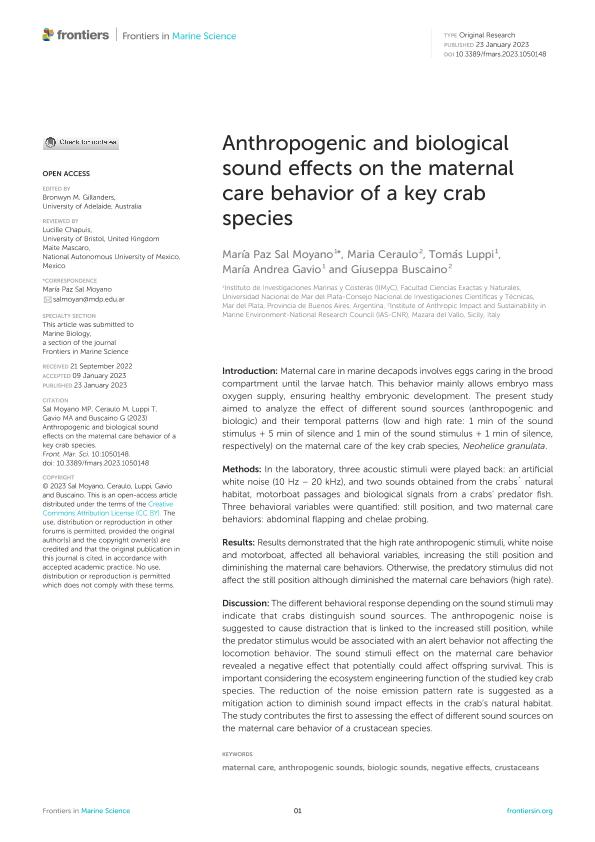Mostrar el registro sencillo del ítem
dc.contributor.author
Sal Moyano, María Paz

dc.contributor.author
Ceraulo, Maria

dc.contributor.author
Luppi, Tomas Atilio

dc.contributor.author
Gavio, Maria Andrea

dc.contributor.author
Buscaino, Giuseppa
dc.date.available
2023-10-25T15:07:01Z
dc.date.issued
2023-01
dc.identifier.citation
Sal Moyano, María Paz; Ceraulo, Maria; Luppi, Tomas Atilio; Gavio, Maria Andrea; Buscaino, Giuseppa; Anthropogenic and biological sound effects on the maternal care behavior of a key crab species; Frontiers Media; Frontiers In Marine Science; 10; 1-2023; 1-11
dc.identifier.issn
2296-7745
dc.identifier.uri
http://hdl.handle.net/11336/215908
dc.description.abstract
Introduction: Maternal care in marine decapods involves eggs caring in the brood compartment until the larvae hatch. This behavior mainly allows embryo mass oxygen supply, ensuring healthy embryonic development. The present study aimed to analyze the effect of different sound sources (anthropogenic and biologic) and their temporal patterns (low and high rate: 1 min of the sound stimulus + 5 min of silence and 1 min of the sound stimulus + 1 min of silence, respectively) on the maternal care of the key crab species, Neohelice granulata. Methods: In the laboratory, three acoustic stimuli were played back: an artificial white noise (10 Hz – 20 kHz), and two sounds obtained from the crabs´ natural habitat, motorboat passages and biological signals from a crabs’ predator fish. Three behavioral variables were quantified: still position, and two maternal care behaviors: abdominal flapping and chelae probing. Results: Results demonstrated that the high rate anthropogenic stimuli, white noise and motorboat, affected all behavioral variables, increasing the still position and diminishing the maternal care behaviors. Otherwise, the predatory stimulus did not affect the still position although diminished the maternal care behaviors (high rate). Discussion: The different behavioral response depending on the sound stimuli may indicate that crabs distinguish sound sources. The anthropogenic noise is suggested to cause distraction that is linked to the increased still position, while the predator stimulus would be associated with an alert behavior not affecting the locomotion behavior. The sound stimuli effect on the maternal care behavior revealed a negative effect that potentially could affect offspring survival. This is important considering the ecosystem engineering function of the studied key crab species. The reduction of the noise emission pattern rate is suggested as a mitigation action to diminish sound impact effects in the crab’s natural habitat. The study contributes the first to assessing the effect of different sound sources on the maternal care behavior of a crustacean species.
dc.format
application/pdf
dc.language.iso
eng
dc.publisher
Frontiers Media

dc.rights
info:eu-repo/semantics/openAccess
dc.rights.uri
https://creativecommons.org/licenses/by-nc-sa/2.5/ar/
dc.subject
ANTHROPOGENIC SOUNDS
dc.subject
BIOLOGIC SOUNDS
dc.subject
CRUSTACEANS
dc.subject
MATERNAL CARE
dc.subject
NEGATIVE EFFECTS
dc.subject.classification
Conservación de la Biodiversidad

dc.subject.classification
Ciencias Biológicas

dc.subject.classification
CIENCIAS NATURALES Y EXACTAS

dc.title
Anthropogenic and biological sound effects on the maternal care behavior of a key crab species
dc.type
info:eu-repo/semantics/article
dc.type
info:ar-repo/semantics/artículo
dc.type
info:eu-repo/semantics/publishedVersion
dc.date.updated
2023-10-25T10:18:22Z
dc.journal.volume
10
dc.journal.pagination
1-11
dc.journal.pais
Suiza

dc.description.fil
Fil: Sal Moyano, María Paz. Consejo Nacional de Investigaciones Científicas y Técnicas. Centro Científico Tecnológico Conicet - Mar del Plata. Instituto de Investigaciones Marinas y Costeras. Universidad Nacional de Mar del Plata. Facultad de Ciencias Exactas y Naturales. Instituto de Investigaciones Marinas y Costeras; Argentina
dc.description.fil
Fil: Ceraulo, Maria. Consiglio Nazionale delle Ricerche; Italia
dc.description.fil
Fil: Luppi, Tomas Atilio. Consejo Nacional de Investigaciones Científicas y Técnicas. Centro Científico Tecnológico Conicet - Mar del Plata. Instituto de Investigaciones Marinas y Costeras. Universidad Nacional de Mar del Plata. Facultad de Ciencias Exactas y Naturales. Instituto de Investigaciones Marinas y Costeras; Argentina
dc.description.fil
Fil: Gavio, Maria Andrea. Consejo Nacional de Investigaciones Científicas y Técnicas. Centro Científico Tecnológico Conicet - Mar del Plata. Instituto de Investigaciones Marinas y Costeras. Universidad Nacional de Mar del Plata. Facultad de Ciencias Exactas y Naturales. Instituto de Investigaciones Marinas y Costeras; Argentina
dc.description.fil
Fil: Buscaino, Giuseppa. Consiglio Nazionale delle Ricerche; Italia
dc.journal.title
Frontiers In Marine Science

dc.relation.alternativeid
info:eu-repo/semantics/altIdentifier/url/https://www.frontiersin.org/articles/10.3389/fmars.2023.1050148/full#:~:text=The%20diverse%20sound%20stimuli%20emitted,predator%20(high%20rate)%20reduced%20the
dc.relation.alternativeid
info:eu-repo/semantics/altIdentifier/doi/http://dx.doi.org/10.3389/fmars.2023.1050148
Archivos asociados
